Should you be concerned that hard water will cause kidney stones? What is hard water anyway? Understand if there is a link between hard water and kidney stones. And, how to know if you have hard water and what you can do about it!
*Please note that this post contains clearly identified affiliate links. If you click on these links and choose to make a purchase, I may receive a commission (at no cost to you).
Table of Contents
What Is Hard Water?
Hard water is defined by a relatively high amount of calcium and magnesium. Hard water also has minerals like aluminum, iron, zinc, manganese and barium, but most of the “hard” comes from calcium. The degree of hard water is measured in “grains per gallon”. All of these minerals end up in our water from soil or rocks. (1)
Hard water is known for making less “lather” when mixed with soap. It can also leave a ring around your bathtub or white residue on appliances like coffee makers or ice machines. Hard water often has a different taste compared to soft water, may leave a residue after you wash your hair, make cleaners less effective and makes water heaters less energy efficient.
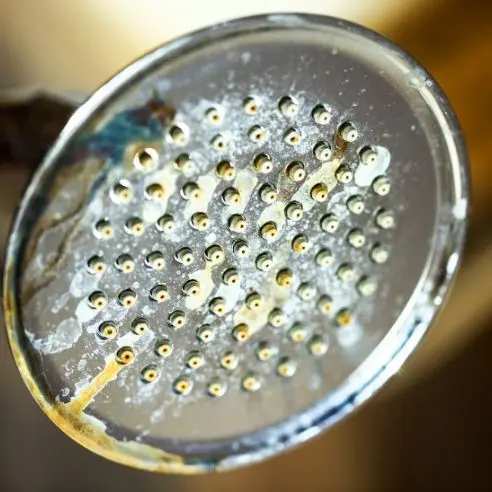
Other than these mostly cosmetic annoyances, hard water is not bad for your health. In fact, some studies have linked hard water with lower risk of mortality from heart disease. However, no conclusions can be made from these preliminary studies. (2)
But what about kidney stones? Does hard water cause kidney stones? Let’s first understand how much calcium is in hard water and if that calcium could affect stone risk.
How Much Calcium Is In Hard Water?
The amount of calcium in hard water varies widely depending on location and water source.
The World Health Organization defines hard water based on the amount of calcium carbonate per liter. (1)
- Moderately hard water: 60-120 milligrams calcium per liter
- Hard water: 120-180 milligrams calcium per liter
- Very hard water: more than 180 milligrams calcium per liter
How Much Magnesium Is In Hard Water?
Compared to calcium, there is not much magnesium in hard water. Amounts vary, but usually hard water has around 50mg of magnesium per liter.
Does Our Body Absorb Minerals From Hard Water?
On average, our bodies absorb around 50% of the minerals in drinking water. Surprisingly, minerals from water contribute 5-20% of the total amount of minerals we eat! (1)
The amount of calcium absorbed from hard water is very different between people. Intestinal absorption of calcium is highly dependent on how much calcium your body needs. For example, if your body needs more calcium, it will absorb a greater percentage of calcium from your food. Other factors, such as vitamin D status, also impact calcium absorption. (3)
What Is Soft Water?
On the flip side, soft water is defined as having a low amount of calcium per liter. The WHO defines soft water as having less than 60mg of calcium per liter. (1)
Where Do You Find Hard Water?
Hard water is found all over the world. Water hardness is dependent on the level of minerals in the soil where you live.
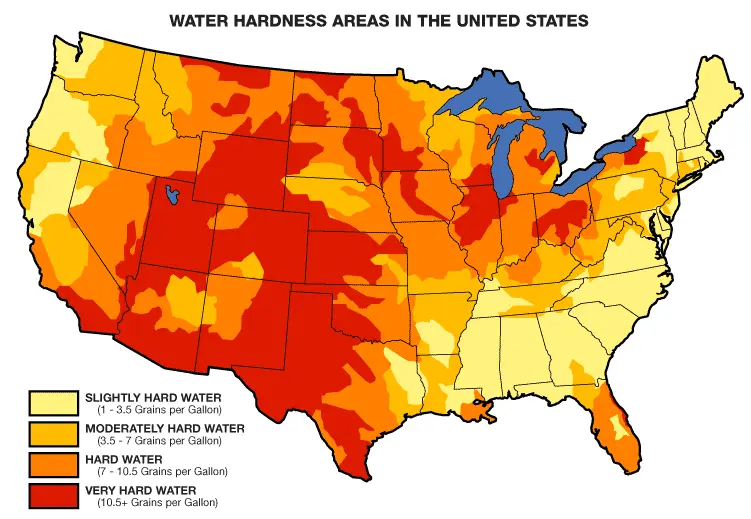
Does Hard Water Cause Kidney Stones?
People Without a History of Kidney Stones
Hard water is unlikely to cause kidney stones for most people.
A few small studies have shown that urine calcium goes up after drinking hard water (5) (6). And, high urine calcium is a risk factor for kidney stones. However, studies have not found more kidney stones in people who live in areas with hard water.(7) (8)
If you do not have a history of kidney stones, hard water is unlikely to cause kidney stones.
People With a History of Kidney Stones
If you do have a history of kidney stones, or have high urine calcium, it is probably a good idea to know how much calcium is in your tap water. Drinking a lot of hard water could make high urine calcium worse. (5) (6)
Calcium supplements are associated with kidney stones, whereas eating high calcium foods is protective. (9) Although no research has been done, calcium carbonate in hard water probably acts more like calcium supplements than calcium from food.
Calcium in hard water might be especially concerning given the high fluid recommended for kidney stone prevention. People with kidney stones are often told to drink at least 2 1/2 liters of fluid per day. At these high intakes, hard water could add quite a bit of calcium to your day.
Please note that very little research has been done to determine if hard water causes kidney stones in people who have had kidney stones. So, it is hard to say if hard water is a big contributor to kidney stones. But, I do think it makes sense to be aware of the calcium content of your water. Knowledge is power!
How Do I Know If I Have Hard Water?
Test Strips
You can check the hardness of your water at home with some simple test strips. These test strips* will tell you approximately how much calcium is in your water.

You can also try a fancy home water test kit*, which will give you much more information about your water. This test kit will tell you the specific amount of calcium, sodium and other minerals in your water.

Check With Your City
If your water comes from a city, annual testing is required and the results must be made available to the public. This is a great option because you can see how much sodium is in your water too. Call your city or look online for your water report.
Make sure your city reports the amount of calcium in your water – not all do!
Non-Specific Home Test
You can also do an simple DIY test at home to check calcium and sodium levels in your tap water. Of course, this option doesn’t tell you exactly how much calcium is in your water. But, is a free and easy starting point to see if you need to dig in further.
What Can I Do If I Have Hard Water?
If you have hard water, chances are this is completely fine and will not impact your health.
However, if you have kidney stones and are concerned about the extra calcium, there are a few options.
Note that Brita (or similar brands) filters do not remove calcium or sodium from water.
Buy Bottled or Distilled Water
Distilling water removes all minerals, including calcium and sodium. Distilled water has zero calcium or sodium.
Instead of buying individual water bottles, a more environmentally friendly option is buying gallons of distilled water. Or, you can even purchase large jugs of distilled water and a water dispenser for your home.
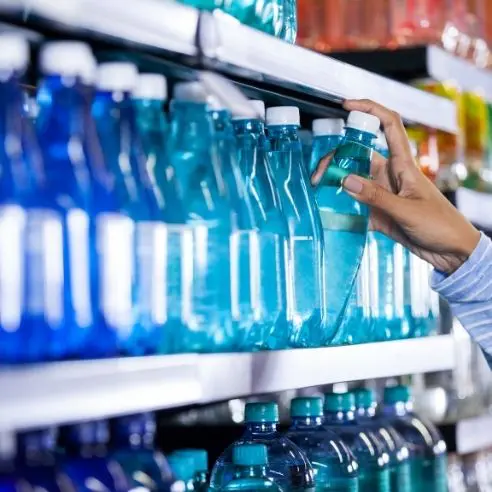
Use a Water Softener
In areas that have very hard water, the city or municipality often softens water for you.
If you have well water, you likely have a water softener at home.
Sodium & Water Softeners
Water softening removes some of the calcium and magnesium from hard water. Water softening usually involves swapping each molecule of calcium or magnesium for a molecule of sodium. The harder your water is, the more calcium and magnesium must be removed, and the more sodium is added during softening.
This could be a problem for people with kidney stones. A high sodium diet can cause kidney stones. Usually, the amount of sodium added during water softening is minimal. But, could be significant in some cases.
How Much Sodium is Added During Softening?
The amount of sodium that is added during water softening varies widely. For very hard water, about 150mg of sodium is added per quart. Assuming you drink 3 liters of tap water per day, this is an additional 450mg of sodium (20-30% of the daily recommendation). Less sodium would be added to less hard water during softening.
Your city’s water quality report may tell you how much sodium is in your water. Sodium is usually reported in “parts per million”, which is equivalent to “mg per liter”. You can usually find water quality reports online, or you can call your city.
If you have a water softener at home, this site can help you understand how much sodium is getting added based on how hard your water is.
You can also test your water for sodium yourself with a fancy home test kit*.
How Can I Prevent Kidney Stones?
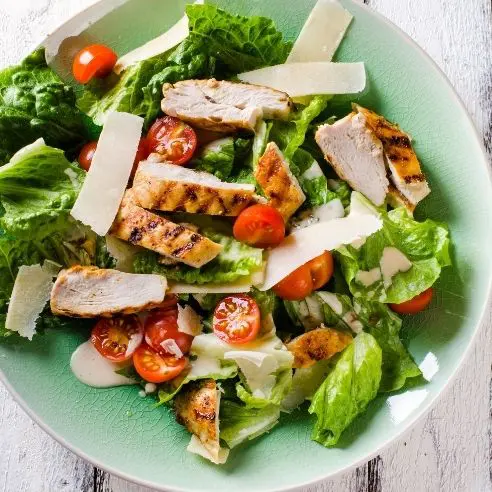
Chances are, hard water is not the sole cause of kidney stones. Hard water may exacerbate high urine calcium, but is unlikely to be the initial cause.
Although there are many causes of kidney stones, a poor diet is one of them.
Generally, the key parts of a healthy diet for kidney stone prevention are:
- Drinking lots of water
- Limiting sodium
- Limiting added sugar
- Eating the right amount of protein
- Eating lots of fruits and vegetables
Learn more about healthy eating for calcium oxalate kidney stone prevention.
Happy Eating!
Melanie

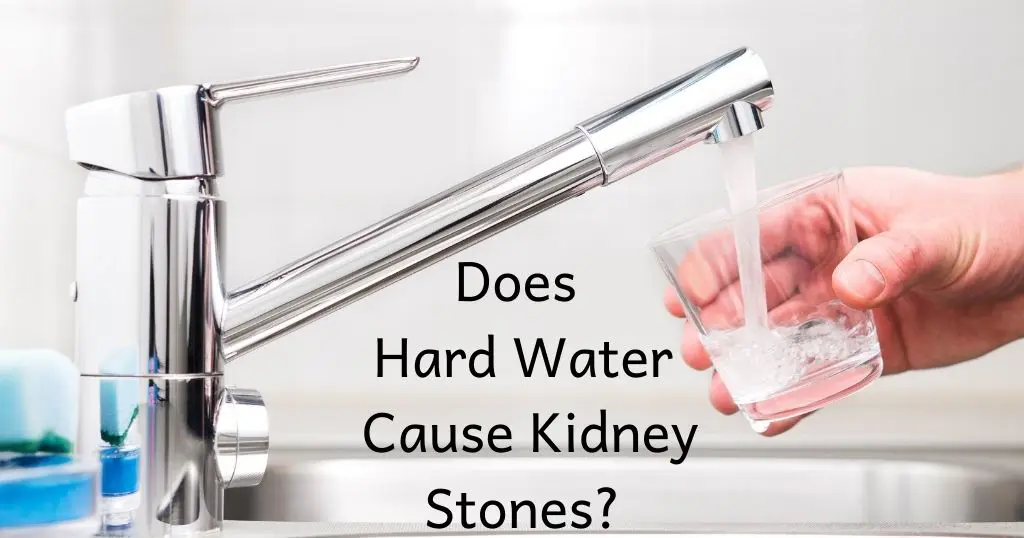
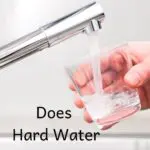
The article did not mention substituting potassium crystals for the usual sodium crystals in most water softening systems. Wouldn’t using potassium in a water softener be more beneficial for people with a history of calcium kidney stones?
Good point! My understanding is potassium isn’t often used for water softening as it is much more expensive and you need a lot more of it for equal water softening purposes (but I could be wrong there!). However, I also don’t think that the amount of potassium you’d get from that water softening is really enough to impact health.
The info about potential problems from tap water is very interesting to me since by husband has both recurrent kidney stones (one large enough to require removal of part of a ureter) and CKD from both diabetes and AKI. He drinks a gallon of tap water with lemon juice a day to correct low citrate level. We always keep bottles of water in the car but at home he drinks mostly tap water which is soft in our area. I really hate to make the investment in another machine since we already have a C-Pap, toe to waist compression suit and cases of Glucerna and bottled water taking up space in our house. Would something like a Britta water pitcher or similar device filter out calcium and sodium? It seems to be less expensive and takes up little space. Thank you.
Unfortunately Britta pitchers (and the like) don’t filter out sodium or calcium very well. I’d wonder how much sodium or calcium he is actually getting from the tap water. For most people, it isn’t enough to make a difference.
Hi Melanie,
I was concerned about my water softener salt causing stones. It has been a while ago now; but I did ask either the Urologist or Nephrologist if l would develop kidney stones from my water softener. I told him l don’t have a separate water faucett without the softened water. He said no.
Thank you,
LeeAnn
I agree with your urologist. For MOST people, water softeners are not a likely culprit for kidney stones.
Brita does make a filtering pitcher with an ion exchange filter to reduce calcium and magnesium in water. It’s the Brita Marella XL pitcher, using the Brita Maxtra+ filter. I think that it’s been used in Europe for awhile.
Good to know!
Hi Melanie,
This is a great article! Thanks a lot. I have a little different question regarding this subject. If you have a family member who has only one kidney (naturally since birth) should we be concerned that even though hard water( Calcium) is not causing kidney stones in the short run, in the long run it may be causing more “wear and tear” on the only kidney? And so it is better to use a softener that actually REMOVES the calcium? Will the softener system actually take off the “workload” (of removing the excessive hardness/calcium) from the kidney to ensure it’s long term operation and survival?
Thank you very much.
Hello! Definitely not. Assuming normal kidney function and normal urine chemistry, there is o reason to avoid hard water. Of course, I can’t say for sure for your family member as I’m not 100% familiar with their medical history.
Thank you for this article. This agrees with my own research and articles I have written. The minerals in tap water are dissolved solids from rocks and mineral deposits that water comes in contact with, such as calcium carbonate which is found in some antacids, supplements, and candies. Water is a very powerful solvent. Our water comes from deep artesian wells, lots of rock.
I have been distilling water using distiller for at least 17 years to mitigate the calcium in my drinking water, with great results. In the US, you should be able to find relatively inexpensive distillers for around $100, check eBay. You do not need carbon filters, special cleaners, or consumables. Get a cheap descaler from your hardware store like CLR to remove the mineral buildup or use a coffee machine descaler (I make my own descaler). My distiller came with unnecessary carbon filters… Uh.. The water was already purified. I run my distiller on the basement or garage, as it is noisy.
Make sure to seal the distilled water bottle, because pure H2O will start to absorb molecules from the air. Distilling removes good minerals like magnesium, so make you folks get it through your food. I highly recommend distilled water for those suffering from kidney stones.
Reverse osmosis removes ALL minerals from the water. I know because I have one for my espresso machine. We have hard water in the Dallas area. My RO system includes a remineralization cartridge (many do) which puts back just enough Ca and Mg for the water to taste good.
Try again….my first post hung up
Reverse osmosis water filtering – what can you share about it? I installed one a couple of years ago and really like the taste of water.
Thanks!
Hi Cathi! I don’t believe that removes calcium from water – but I would check with the manufacturer of whatever filter you installed to double check!
Sorry for the strange technical difficulties!
I’m interested in finding out about Reverse Osmosis water filtering systems. I installed one in my home a couple of years ago.
I don’t believe that type of filtering removes much calcium – but I’d recommend checking with the company/manufacturer of the filter you installed to double check!
I started distilling my water at home last year. I purchased a countertop water distiller (with water carafe) for approximately $275 CDN. It distills 4L at a time and runs for approximately 5 hours. I run it once a day when I go to bed at night. My only real issue is that it is quite loud, which is why I do it at night. I also purchased a 3 gallon beverage dispenser (approx. $35 CDN), so I can have some extra on hand. The distiller requires cleaning (due to mineral buildup) approximately once every 4 weeks. So the cost to run it is the electricity plus a cleaner. If your tap water is not filtered, you can also purchased charcoal filters to replace monthly, so that might be an expense. Just thought this would be interesting for other kidney stone sufferers!
Wow! This is amazing! Thank you SO very much for sharing. It is good to hear that distilling water can successfully be done at home. And, more cost efficiently (and earth friendly!) in the long run compared to buying bottled water all the time.